
Parallelogram Lines of Symmetry Explained! — Mashup Math
A parallelogram has two lines of symmetry if the figure can be divided into two halves that are mirror images of each other along two lines. The lines of symmetry divide the parallelogram into quadrants. The quadrants are the four parts into which a plane is divided by two perpendicular lines or axes.

What is a Parallelogram? (Definition & Properties) //
There are no symmetry lines in a parallelogram. It possesses order two rotational symmetry. If we ask why the parallelogram does not have lines of symmetry, the simplest answer is that it is impossible to construct a line of symmetry, an axis, or an imaginary line that passes through the center cutting its image in half where each side.

How many lines of symmetry does the parallelogram BTPK have? middle
The letter A is folded at the lines. 1 of 2 Slide 1 of 2, , The letter A is marked with fold lines. Only in the third example does the folded part of the shape fit exactly over the original.
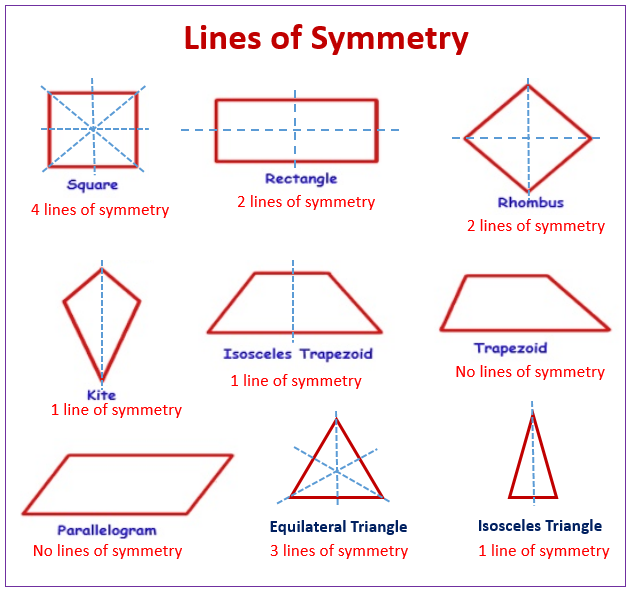
Maths Home Learning 03/11/20 Selsdon Primary Year 3
Parallelogram In Euclidean geometry, a parallelogram is a simple (non- self-intersecting) quadrilateral with two pairs of parallel sides. The opposite or facing sides of a parallelogram are of equal length and the opposite angles of a parallelogram are of equal measure.

Line of Symmetry of Regular Polygon [with Formula and Examples]
There is no line of symmetry of a parallelogram along its length, breadth. There is no superimposition of one half on the other when folded along its half. The diagonals are not symmetrical. This is because, when we fold the parallelogram along the diagonal line, we do not get the same shape as two halves.
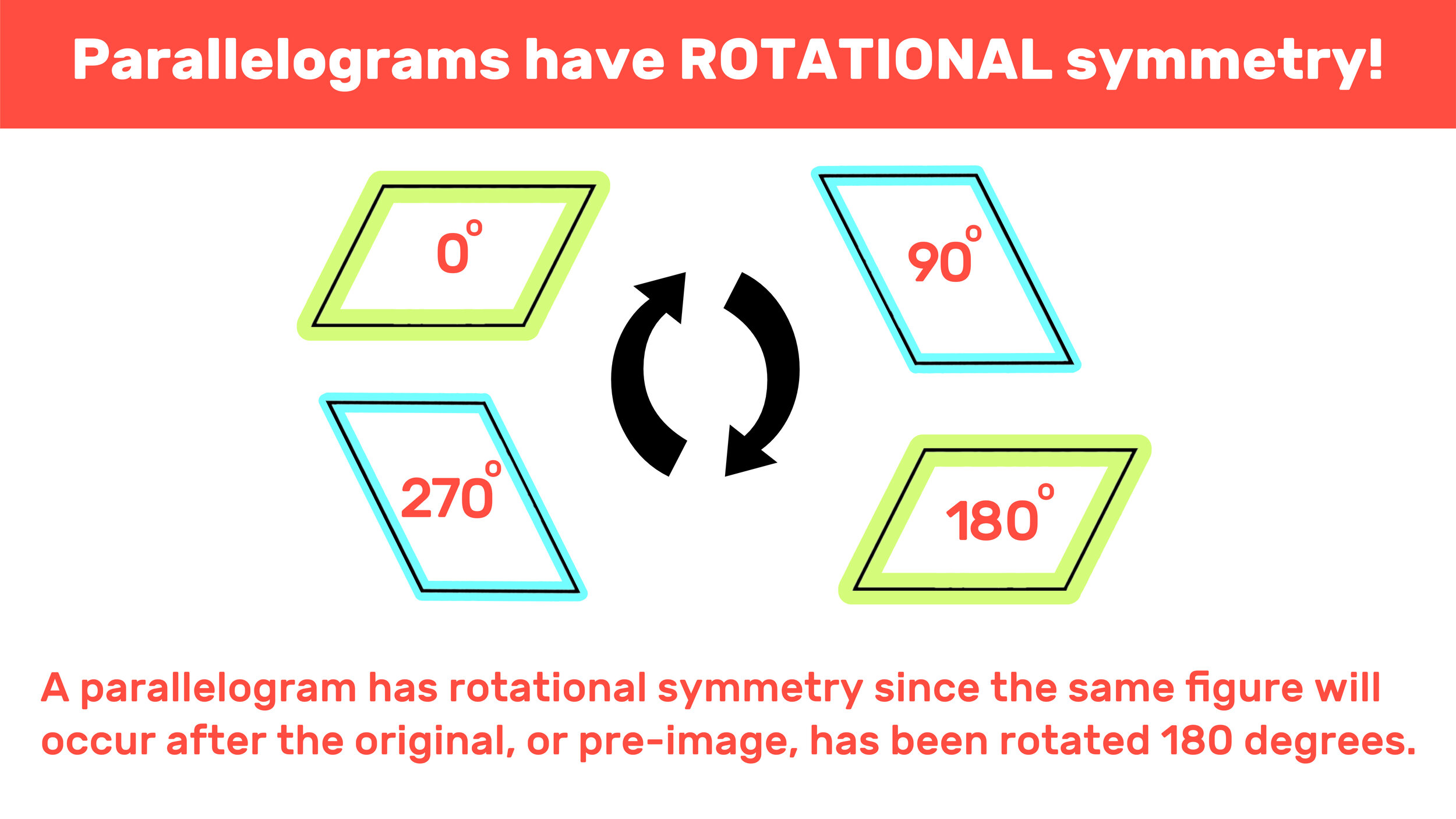
Parallelogram Lines of Symmetry Explained! — Mashup Math
A line of symmetry is a line that you can draw across a shape and divide it into two mirror-images. That is to say, each half of the shape is the same, but looks like its been flipped from the other. You can also think of a line of symmetry as a line that you can draw, that when you fold the shape over the line both edges would line up exactly.

Parallelogram Lines of Symmetry Explained! — Mashup Math
Parallelograms have zero lines of symmetry because it is impossible to draw a line through the center of any parallelogram that divides the figure into two equal halves that are mirror images of each other.
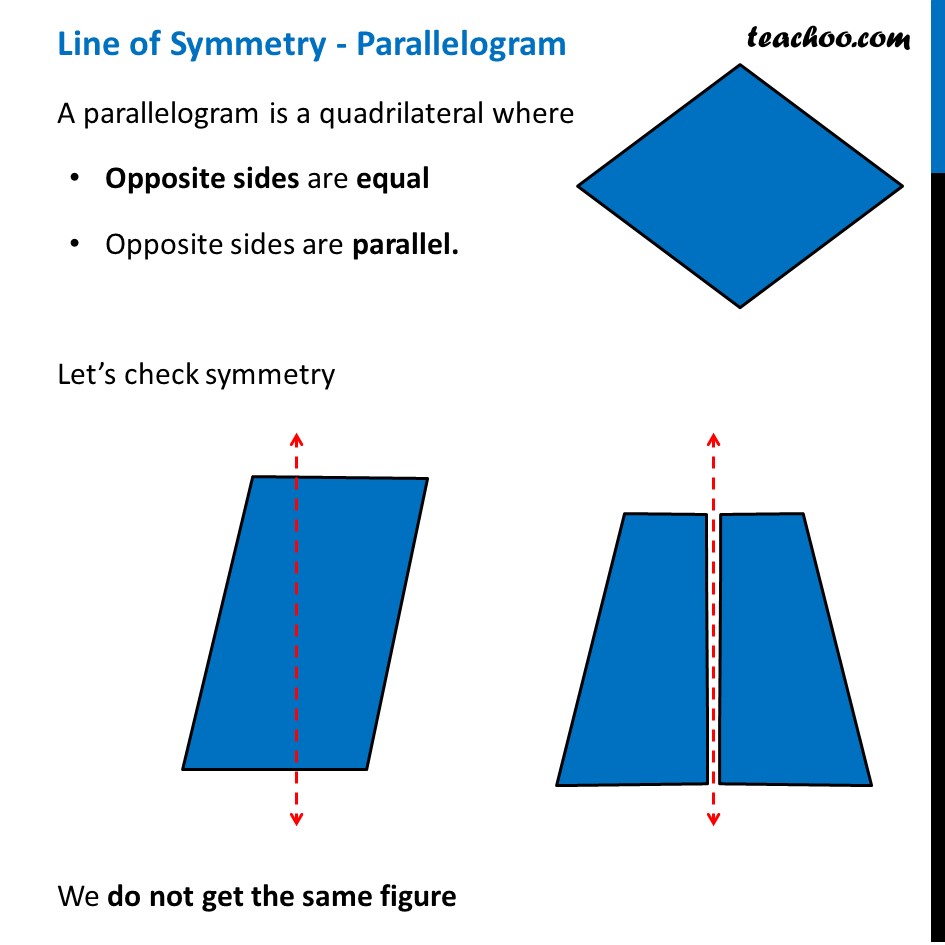
Line of Symmetry of Parallelogram How many? Teachoo Figures with
A Parallelogram in general has no lines of symmetry. However, a parallelogram does have a decisive (rotational) symmetry - the half-turn around the median point at which the two diagonals intersect. As shown in the image below, because triangles WXO and YZO are congruent (have the same size and shape), thus WO= YO XO = ZO

Types of Symmetry Read Full Details on Embibe
If a symmetry pairs two vertices, then the angles at those vertices must be congruent. A symmetry that pairs adjacent vertices of a parallelogram requires that the figure be a rectangle: adjacent angles are supplementary; if they're also congruent, then they must be right angles.. Having ruled out rectangles, your proposed symmetry must pair each vertex (a) with its non-adjacent counterpart.
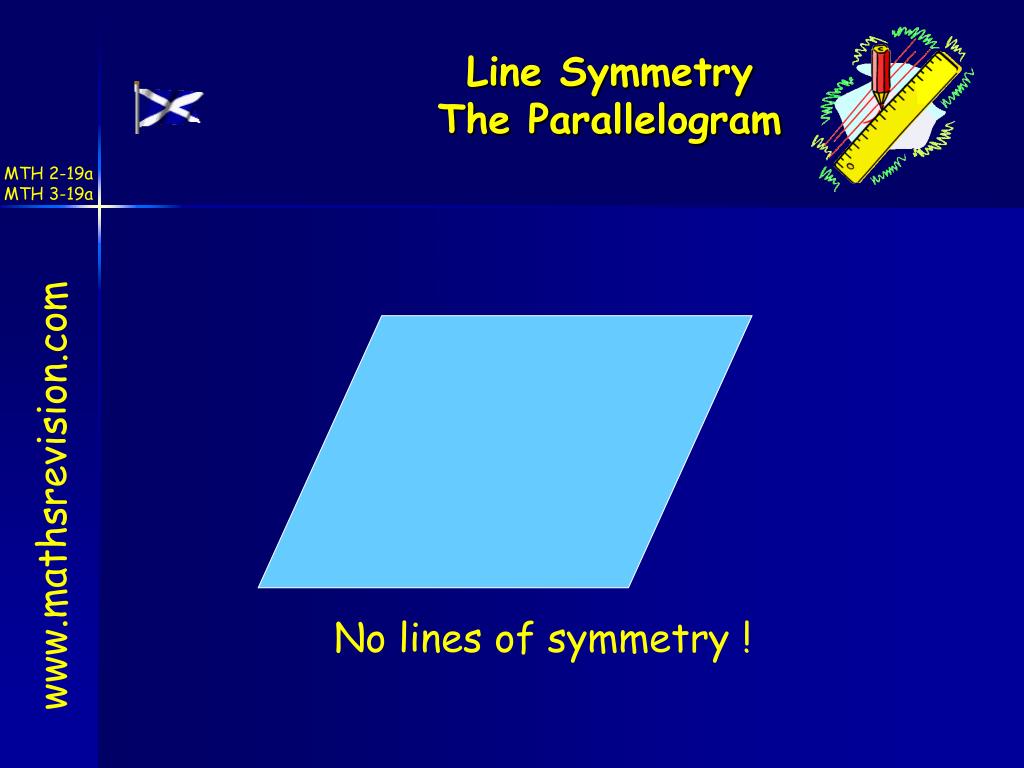
PPT Symmetry PowerPoint Presentation, free download ID474515
We have plane shapes in geometry that have line symmetry such as square, rectangle, triangle, rhombus, parallelogram, etc. Some of the common examples of the line of symmetry in two-dimensional shapes are given below:. Line Symmetry in Square. A square has 4 lines of symmetry, which are lines through the opposite vertices, and the lines through the midpoints of opposites sides make up the four.
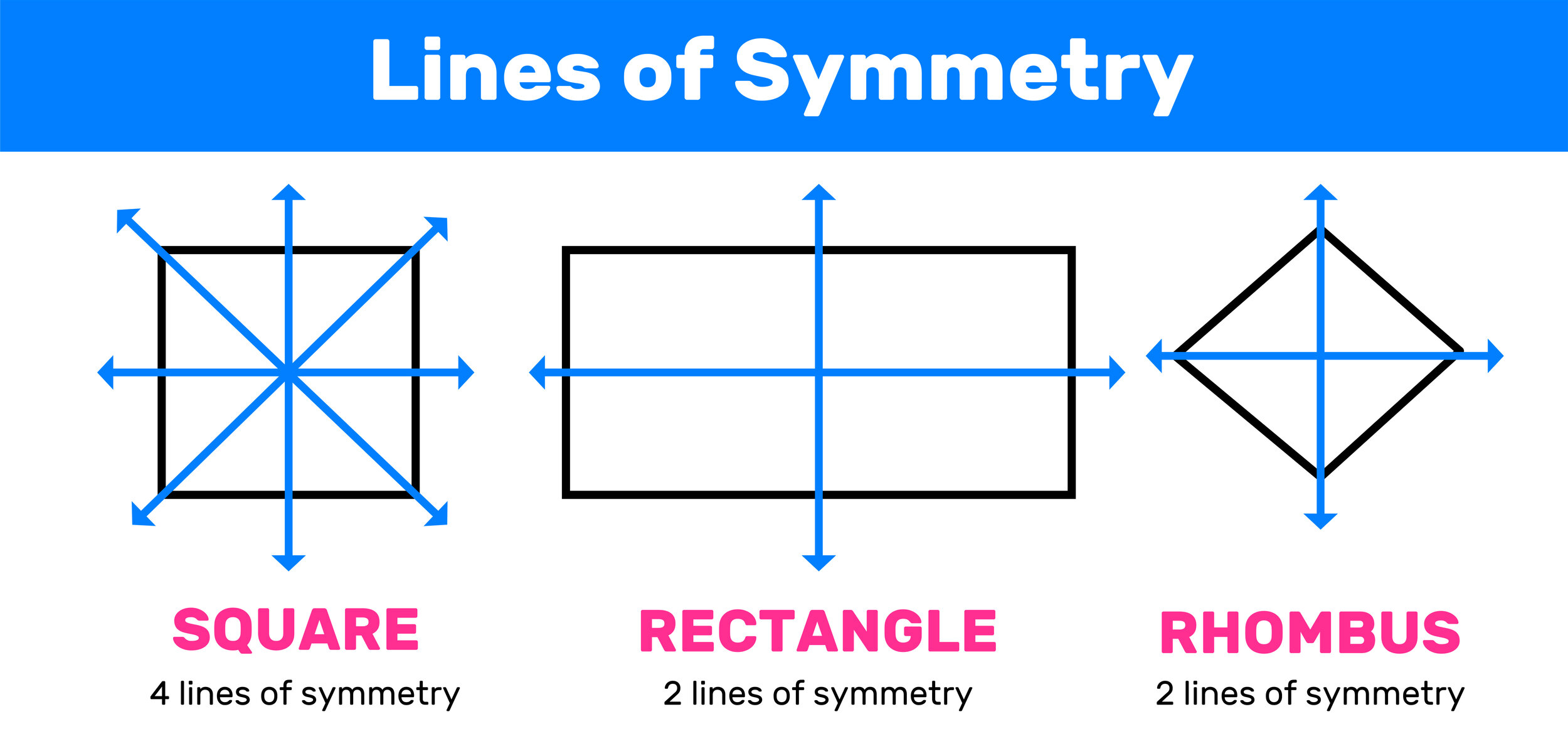
Optimistický Omráčit Absurdní how many lines of symmetry does a square
General parallelogram has no lines of symmetry. Some specific types of parallelogram do. See below. Explanation: Rhombus is a special type of parallelogram and it has two lines of symmetry - its diagonals. Rectangle, which is not a square, has two lines of symmetry - two lines going through the midpoints of opposite sides.

What is a Parallelogram? (Definition & Properties) //
In general, it is true that parallelograms have no lines of symmetry. But there are some parallelograms like square, rectangle, rhombus, kite, and isosceles trapezium that do have lines of symmetry.

Rotational Symmetry Definition, Properties, Angle of Symmetry, Examples
A parallelogram has no lines of symmetry because there is no line that can divide it such that the two halves will be mirror images. Even though the two halves would have the exact same shape, to be a line of symmetry, reflecting one half across the line must cause the half to perfectly overlap the other half. For a paralellogram, we would have.
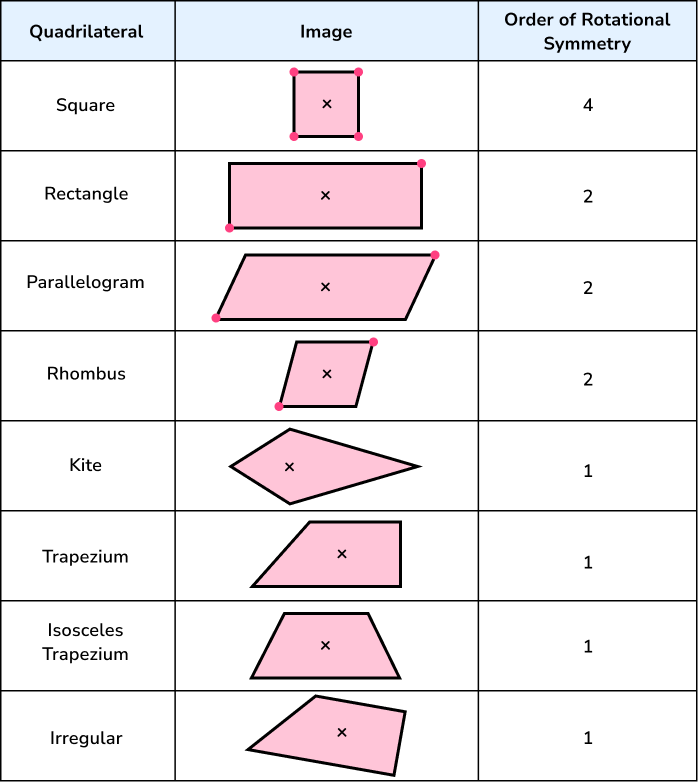
Rotational Symmetry GCSE Maths Steps, Examples & Worksheet
A parallelogram has no lines of symmetry.. Some trapeziums have one line of symmetry. They are called isosceles trapeziums as they have 2 sides of an equal length like isosceles triangles.
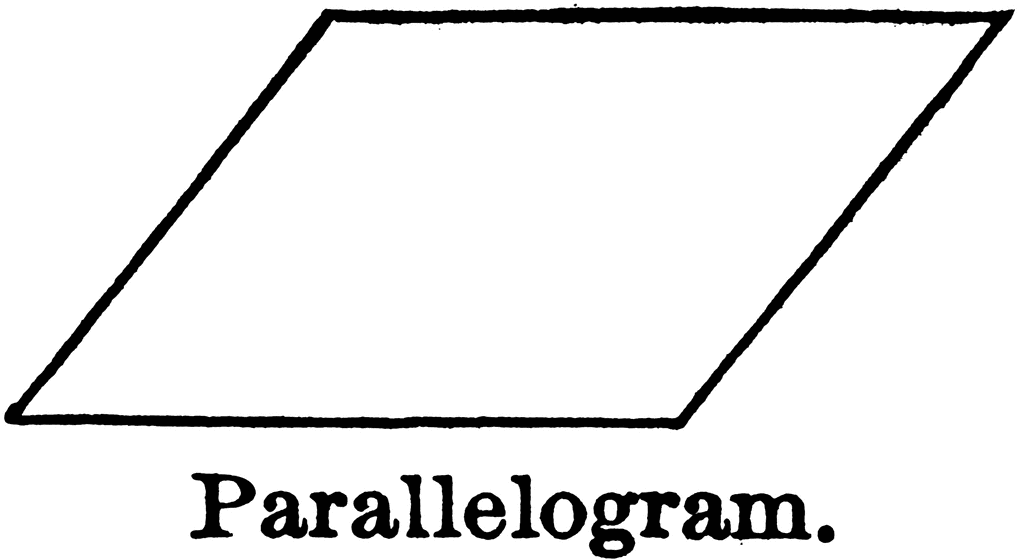
Parallelogram ClipArt ETC
We know that parallelograms are classified based on their shapes, line segments, and corners. As a result, they have different symmetry lines and a different number of symmetry lines. By folding a shape and looking for the Line of Symmetry, we can determine whether it is symmetrical.

Expert Maths Tutoring in the UK Boost Your Scores with Cuemath
A parallelogram is a quadrilateral whose opposite sides are equal and parallel. There are 3 main types of parallelograms which are square, rectangle and rhombus. Q2 How Many Lines of Symmetry are There in Parallelograms? Different parallelograms have different numbers of symmetry lines. Square = 4 Rectangle = 2 Rhombus = 2